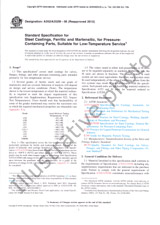We need your consent to use the individual data so that you can see information about your interests, among other things. Click "OK" to give your consent.
ASTM F763-22
Standard Practice for Short-Term Intramuscular Screening of Implantable Medical Device Materials
Translate name
STANDARD published on 1.9.2022
The information about the standard:
Designation standards: ASTM F763-22
Publication date standards: 1.9.2022
SKU: NS-1083943
The number of pages: 5
Approximate weight : 15 g (0.03 lbs)
Country: American technical standard
Category: Technical standards ASTM
The category - similar standards:
Annotation of standard text ASTM F763-22 :
Keywords:
biocompatibility, biomaterials, New Zealand white rabbits, orthopedic medical devices, paravertebral muscles, short-term implantation, tissue compatibility,, ICS Number Code 11.040.40 (Implants for surgery, prothetics and orthotics)
Additional information
| Significance and Use | ||||||||||||||||||||||
|
4.1?The use of 4.2?This practice is intended as a short-term screening procedure for determining the acceptability of candidate materials. It may be utilized prior to using the long-term tests described in Practice F981. It is recommended that for some applications, additional tests, including long-term implantation studies, may be required to assess the final suitability of the candidate materials. 4.3?This practice may not be appropriate for all types of implant applications. The user is cautioned to consider the appropriateness of the method in view of the materials being tested, their potential applications, and the recommendations contained in Practice F748. |
||||||||||||||||||||||
| 1. Scope | ||||||||||||||||||||||
|
1.1?This practice provides guidelines for short-term testing or screening of candidate materials, both porous and dense, as to the local effects of the material that is implanted intramuscularly. This method may not be applicable for absorbable materials, depending on the absorption profile of the test material. The tissue reactions will be evaluated in comparison to those evoked by control materials that are accepted as clinical implant materials. This is a short-term (less than 30 days) screening procedure for determining acceptability of candidate materials. 1.2?This practice, along with other appropriate biological tests (including other appropriate ASTM tests), may be used in the biocompatibility assessment of the candidate materials for use in the fabrication of devices for clinical application. 1.3?This experimental protocol is not designed to provide a comprehensive assessment of the systemic toxicity, carcinogenicity, or mutagenicity of the material since other standards address these issues. 1.4?This practice is one of several developed for the assessment of the biocompatibility of materials. Practice F748 provides guidance for the selection of appropriate methods for testing materials for a specific application. 1.5?The values stated in SI units, including units officially accepted for use with SI, are to be regarded as standard. No other systems of measurement are included in this standard. 1.6?This standard does not purport to address all of the safety concerns, if any, associated with its use. It is the responsibility of the user of this standard to establish appropriate safety, health, and environmental practices and determine the applicability of regulatory limitations prior to use. 1.7?This international standard was developed in accordance with internationally recognized principles on standardization established in the Decision on Principles for the Development of International Standards, Guides and Recommendations issued by the World Trade Organization Technical Barriers to Trade (TBT) Committee. |
||||||||||||||||||||||
| 2. Referenced Documents | ||||||||||||||||||||||
|
We recommend:
Technical standards updating
Do you want to make sure you use only the valid technical standards?
We can offer you a solution which will provide you a monthly overview concerning the updating of standards which you use.
Would you like to know more? Look at this page.




 Cookies
Cookies
